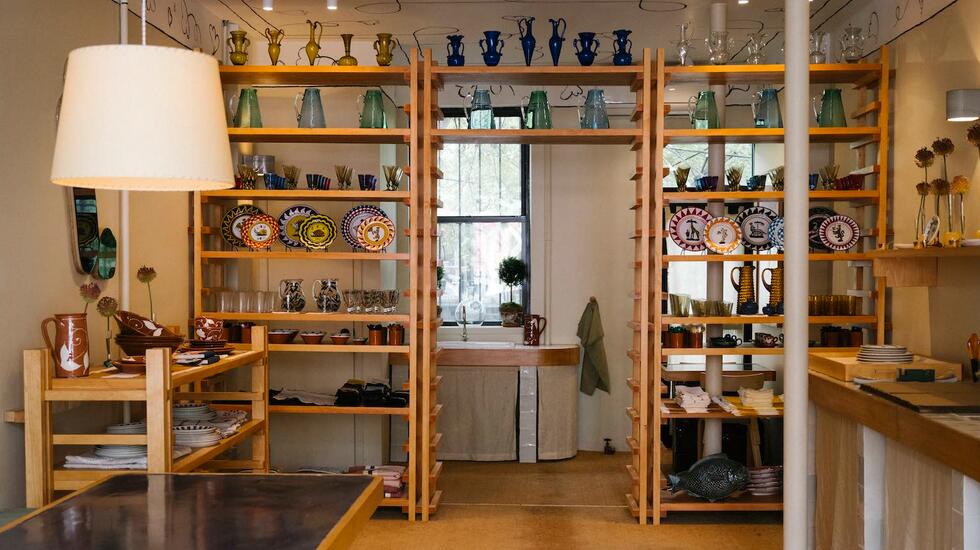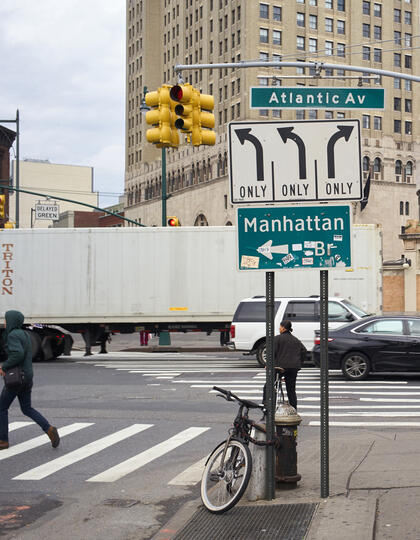Head out on a bagel-fuelled tour of Boerum Hill with Alice Russotti and Francesca del Balzo, founders of the neighbourhood’s hot new homeware store
10 February, 2023

"Boreum Hill is built on its people, and they're people with character," says Alice Russotti, co-founder of independent homeware store PORTA. Both Rusotti and her business partner, Francesca del Balzo, were attracted to the independent spirit of the area when seeking potential shop locations for their new store last October.
The neighbourhood's homespun character had them hooked. Despite its current desirability, this leafy patch of NYC has preserved its founding suburban character. In streets lined with brick and brownstone townhouses, hip coffee shops, up-and-coming restaurants and a Lululemon store rub up against beloved delis, mom-and-pop cafés and sidewalk plant sales.


The window of PORTA, and the shop founders. | Photo credit: Adrianna Glavianno, Daisy Johnson.
PORTA, its serif name stamped across the elegant old-style shopfront, fits right in. The homeware store showcases colourful and creative European craftsmanship in bespoke tableware and whimsical decorative items. To peruse the shelves is to peer across the pond into the workshops of the continent's artisans. The duo - both London-bred, but US-based - collaborated with craftspeople across Europe to reimagine traditional handicrafts for a Brooklyn-based audience. Hand-embroidered tablecloths and napkins from northern Portugal do away with the typical multicoloured designs of traditional napery in favour of a one-tone floral motif. Italian-made plates painted with dizzying designs celebrating the Palio, a biannual wild horse race in Siena's main piazza - are produced by a family-run Tuscan company founded in 1450. Alice's previous careers within auction houses and as a curator have been put to good use; this is a choice edit that amplifies the generational story of European craft for a new audience. The commitment to heritage, with a side helping of creativity, has made it an easy new neighbour in independent-friendly Boerum Hill.
We sat down with the PORTA duo to get the lowdown on shopping local, eating well and supporting community-focused initiatives in the neighbourhood.
Creative, independent and local.
Because Boreum Hill is amazing. It's steeped in history and it's beautiful. There are shops, groceries and butchers that have been here forever, as well as new independent businesses that have moved in more recently.


PORTA offers European-sourced homeware. | Photo credit: Adrianna Glavianno
Black Seed Bagels. They serve delicious, chewy bagels - and have the best playlist in town.
Café Kitsuné on Bond Street. It opened last year, just around the corner from our shop.
Rucola is lovely on a sunny day, when you can sit outside. It has a small menu; we usually go for the quinoa salad or the escarole salad, with added avocado. For a takeout lunch, try Rice & Miso. Just make sure you're hungry.


Atlantic Avenue, left, and PORTA homeware. Photo credit: Gus Powell/NYC & Company, Adrianna Glavianno
The Brooklyn Inn (148 Hoyt St). It's very old-school Brooklyn, with a huge wooden bar.
Head to Outline, a multi-brand boutique started by three childhood friends, one of whom used to work for Opening Ceremony. The space is beautiful and the offering is super cool. You'll also find Primary Essentials on our block, a tableware shop with a different, but complementary offering to PORTA. Consignment Brooklyn is an amazing luxury store nearby, too. It's been here since the 90s. The owner, Eva, has brought the neighbourhood together to create a support network for shopkeepers.
Try Humble House and Michele Varian.
The Invisible Dog Art Centre is housed in a three-storey former factory building built in 1863. It was founded by Lucien Zayan, and the ground floor is used for exhibitions and performances by artists from around the world. The second and third floors are divided up into over 30 artists' studios. There's always something to see there, and you can pop into KULE, which occupies the ground-floor shop, on your way out to buy works from independent designers.


Interiors at ACE Hotel, Brooklyn. | Photo credit: Stephen Kent Johnson
Check out MPatmos, a clothing store that designs modern wardrobe staples and sophisticated, textural knitwear which is made to be passed down to future generations. The brand works with small, family-owned factories and workshops, and merges sustainable artisan techniques with technology to create beautiful designs in luxurious, natural fibres.
We've been impressed by Spoke Circles, too. Founded by Lia Love Avellino, it creates social circles designed to help modern adults engage with others, explore ideas and clarify their life's direction. The space is open and welcoming to all who want and need it.
The Ace Hotel makes the most amazing zucchini bread in the world. It's the perfect combination of savoury and sweet, and we find ourselves going out of our way to buy it. We're never more crestfallen than when they've run out. Cannot live without it.
Our Bud Tablecloth, which we designed with a stamperia [traditional printing house] in Italy. We made the pattern by isolating a single detail from a more ornate Portuguese design, increasing the scale and then having it hand-printed with natural dyes.
